#varangian warrior
Photo

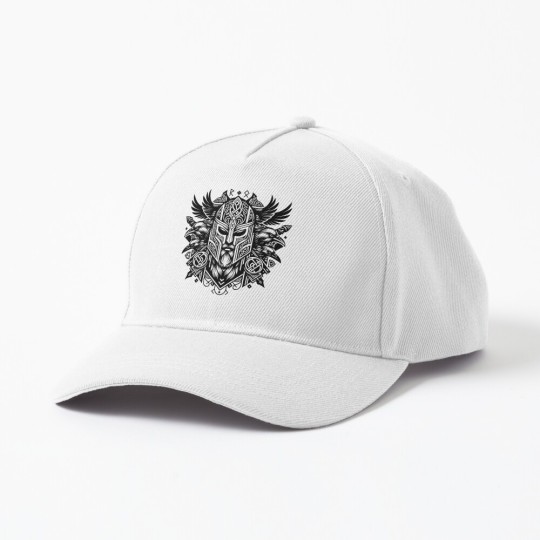


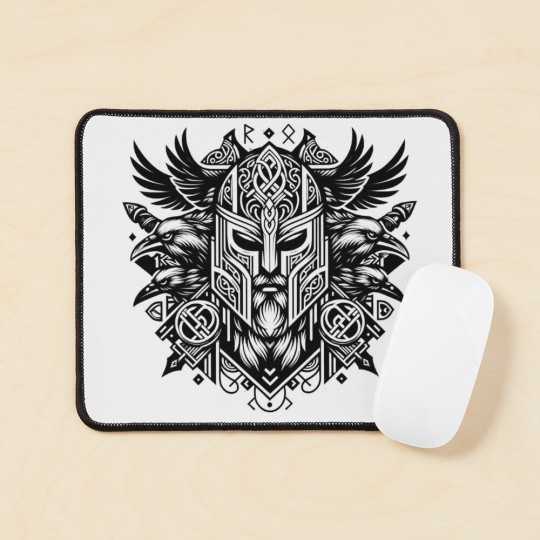


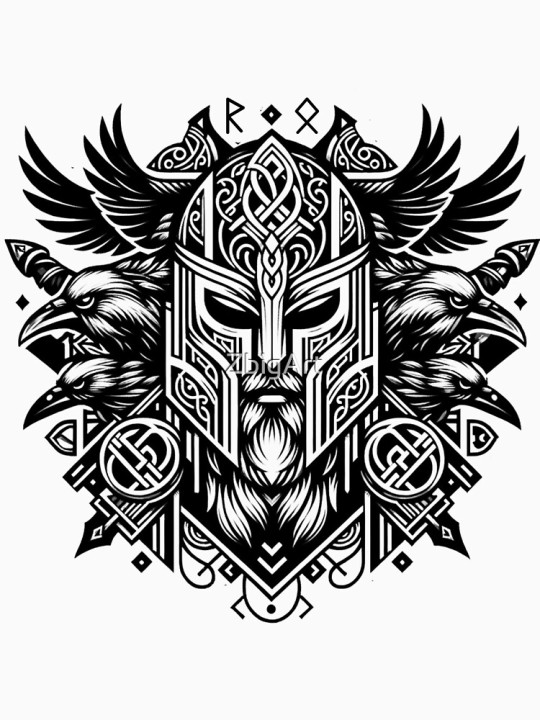
(via "Varangian Warrior: Mythic Ravens" Classic T-Shirt for Sale by ZbigArt)
Dive into Norse lore with this Varangian Warrior art, encircled by ravens and ancient runes. A blend of history and myth, perfect for enthusiasts.
#findyourthing#redbubble#varangian warrior#norse mythology#raven symbolism#raido rune#othala rune#mythological warriors#zbigartco#mystic raven#nordic warrior#byzantium#varangian guard
2 notes
·
View notes
Text
Warriors of history:
"Scandinavians"
(Image 1)
-vikings (10th century)
(Image 2)
-Norse Varangian guards (14th century)
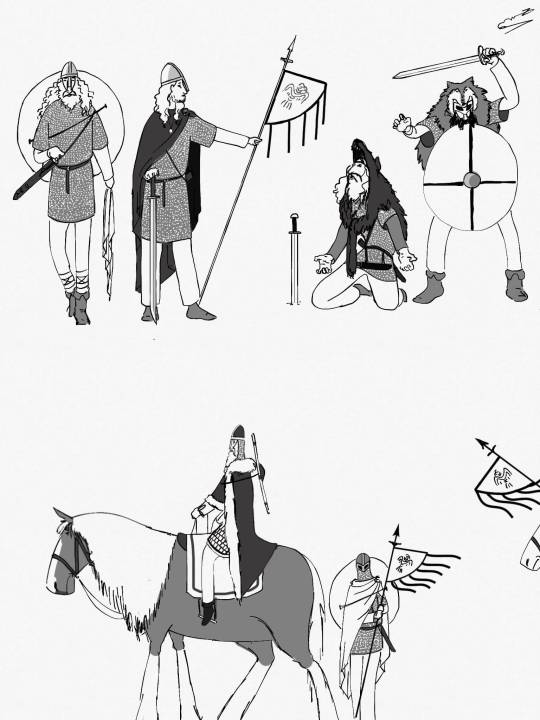
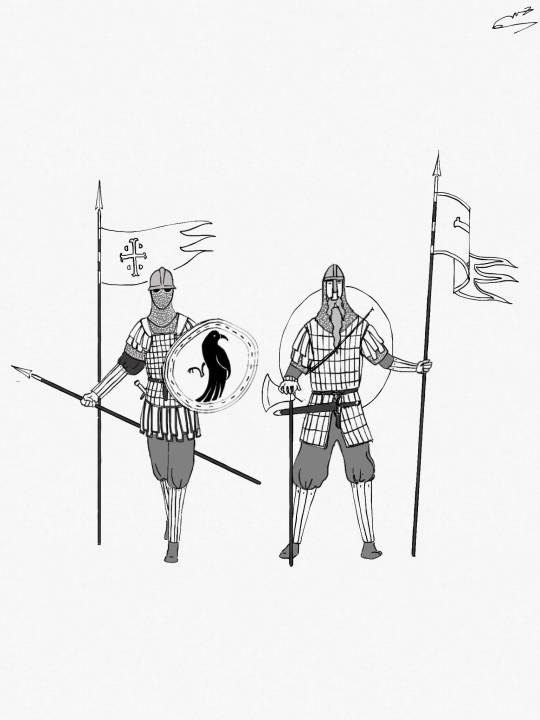
7 notes
·
View notes
Text
The archetype of the viking warrior was inspired by real vikings the same way as the archetype of the spellcasting wizard was inspired by real occultists.
And like wizards, it's a fantasy trope.
Yes, vikings existed in the sense that sea-rading Norsemen existed. But the image of vikings as these ruthless, long-haired, intimidating, ax-weilding warriors bound by oath and noble cause, actually comes from the Varangian Guard: the personal bodyguards of the Byzantine Emperor.
The members of the Varangian Guard were extremely formidable warriors and famous for their loyalty. They also consisted almost exclusively of Norseman for many centuries (due to their size, I bet). And though the Varangians would fight to the death for their loyalties, their loyalties were not with their country or gods like we envision with the trope of the viking warrior: It was with the Christian Emperor of Constantinople.
Unlike the vikings, the Varangian Guard was also a true warrior class. The vikings were pirates first and foremost, and while fightinf skills benefited their expeditions, equating them to the Varangian Guard is a bit like equating bandits to the marines.
I think the "warrior" aspect got tied to vikings due to the fact they're often portrayed as defenders of the Old Ways, standing their ground against the rise of Christianity. While this is certainly romantic, this is yet another fantasy trope.
The idea that vikings pillaged out of hatred for Christianity has its roots in the famous sacking of Lindisfarne monastery in 793. The monks painted this incident as a hate crime against Christianity, but it's far more likely that the vikings raided the monastery because it was undefended and filled with treasure. Either way, this is likely where their reputation of being blatantly anti-Christian came from.
This switched from being a vile thing to a noble one more than a millenium later, starting when the German Romantics reimagined the vikings as warriors. No longer where they antagonistic invaders, but a people defending their way of life from the chaos of a changing world.
The viking warrior exists in the sense that the trope exists. What makes it feel real is the fact that the trope is a shared cultural experience; we all agree that this is what "a viking" looks like. But the fact we all know and recognize this archetype doesn't mean the archetype was ever a real-life thing.
It's like how we all know "the history of King Arthur" even though he was never a real person.
306 notes
·
View notes
Text
Musings on Custodes: Automatons vs Poets
So the first thing to talk about is the tension at the core of how Custodes are currently written: conformity vs individuality, loyalty vs independence.
I'd say that, in storytelling sense, Custodes as a faction are supposed to have three defining characteristics:
One - "superhumanity". A big deal is made throughout all the sources on Custodes lore of how in their skillset they are not just warriors, but also administrators, diplomats, philosophers and so on. Much like one of the proto-iterations of Superman, their fighting ability is not so much a result of mega-uber training and weaponry, but rather a prominent aspect of their overall advanced evolutionary state. "Being superhuman allows you to punch good, but also elevates all other aspects of your being" kind of deal. Everything about them is supposedly heightened - bodies, minds and souls.
But by itself this is nothing unique for a setting somewhat preoccupied with various forms of trans- and post-humanism. A sentence "They have advanced so far beyond humanity that could they even be called humans anymore?" applies to, like, a half a dozen factions throughout the setting. To make them distinct from the rest, Custodes' lore focuses heavily on individual achievement, going to great lengths to hype up the faction as a whole through the descriptions of how cool and accomplished individual custodians are, and it plays up their non-combat skills and abilities as something integral to their identity.
This does succeed in helping them carve out their own unique corner in 40k universe, I believe. It shapes them into not an army, but a lodge of mythic heroes and unique champions, who would each be a protagonist of their own story in a universe of a less epic scale - the Argonauts, the Knights of the Round Table, the Avengers. Such a focus on individuality naturally invites us to imagine them as not just supersoldiers and bodyguards, but indeed as these hyper-personalities, risen and evolved beings, who share all the core human qualities with us, but have them heightened to an incredible degree. Not just warriors, but poets also.
Two - loyalty. An even bigger deal is made of how unflinchingly loyal and wholly devoted to the Emperor custodians are. And, well, no shit - this literally is their purpose as a faction, the very first association that comes to mind once you hear the basic pitch of "emperor's personal guard". And the lore commits fully to this, going on and on about how tireless and focused custodians are in pursuit of their once-failed duty. They are the very epitome of the royal guard, loyal and devoted to such an extent as to become practically an extension of a monarch's own body, an integral symbol of their power over their subjects - the Immortals, the Varangian Guard, the Janissaries.
And Three is the obvious contradiction between the first two: a unique and complex individual, whose entire personality and purpose are built around someone else, a hero with no ambition but service, a philosopher forever beholden to a passed-down ideology. The tension between superhuman individuality and dehumanizing aspects of servitude lies at the very core of the idea of Custodian Guard.
(On a sidenote - the origin of this contradiction seems very interesting to me, because, while all the information that sets it up is present in the modern codexes, it feels to me like it owes a lot of its existence to pre-codex and pre-HH novels versions of the faction. I may recall something incorrectly, but as far as I remember, ever since the black-helmet-and-tits-out rogue trader version the main thing that was known about them was that custodians are so devoted to the Emperor, that they act essentially like automatons in their single minded devotion to him. For example - standing guard completely motionless for literal hundreds of years - clearly the basis for the vigil of Companions of the modern version. I wonder in what part the conception of their current dichotomy came from writers' desire to not retcon the old lore entirely? After all, retcons in 40k do usually aim for a degree of softness, trying to keep the "old" lore as true at least "from a certain point of view")
This brings us to the fun part - how is this contradiction resolved? How does being this particular brand of "more and less than human" actually work? Well, I'd say that in current lore it is mostly just sidestepped, leaving the one true arbiter of 40k lore - you, reading this - to figure it out for yourself.
There is, of course, the satiric version, one that would be most in line with the roots of 40k - that the "poet" aspect of the custodians is just propaganda, tales woven up by impressionable pilgrims and what not. That custodians are essentially just (even more) roided' up space marines, soldiers and bodyguards first and foremost, their higher aspirations beginning and ending with regurgitation of things that the Emperor had once said.
There is the version, perhaps, most true to real life - one that points out that there is no real contradiction between being intellectually hyper-developed and being a loyal and unquestioning servant of a tyrant. Its tempting to believe that things we so appreciate about human nature - wisdom, creativity, capacity for critical thinking - are tools that will always lead those who bear them to some sort of state of universal goodness, but this just isn't so. One can be an example of both the best and the worst that humanity can offer. Human nature contains multitudes, and not all of it is good. When dialed up to 11... well, that's one of the central themes of the whole setting, isn't it?
But, personally, I am a sentimental person, all too easily drawn in by the high drama that 40k offers, and so I tend to latch on explanations of its kind. I really like the idea of custodians being neither unquestioning, nor blindly loyal to the Emperor - and yet still ending up eternally devoted to him. While the nature and the extent of custodes' connection to the Emperor remains murky in the lore, the idea that it is something akin to that of primarchs and their legions is not an uncommon one. And it means that in some way they inherit his personality, that, whether they want it or not they become like him. And thus their loyalty comes not from a place of devotion to a person, but from a place of agreement with his ideals. They are fully capable of what we would call independent thought, fully capable of questioning the Emperor and his designs... It's just that in a bout of tragic determinism they will always arrive to the same conclusions that he once did, make the same decisions if given a chance. Custodians are, in fact, individuals and larger-than-life heroic personalities... It's just that they are mostly the same one.
Anyway, I mostly want to talk about various specific worldbuilding details of AC lore and the storytelling potential that they have, but this somewhat more abstract dichotomy is too central for pretty much all their stuff to be left unacknowledged.
#that's the big one done#there is obviously so much more to talk about in there#especially if we were to veer off into discussions the character of the Emperor himself#but I'll leave it to people more eloquent and patient than I#I really want to talk about things more specific and in-univers-y#just felt that this was sort of the elephant in the room#musings on custodes#adeptus custodes#warhammer 40000
20 notes
·
View notes
Text
youtube
The Varangian Guard : Northern Warriors in Roman Service
from Baltic Empire
34 notes
·
View notes
Text
I should do a character bio for the Princess of Novograd (or was it Novogrod? One of the two).
She’s a warrior princess, fairly young, with an odd employer/employee friendship going on with Dökkálfar Varangian Guards who form her personal guard.
Would be cool to have a model for her.
8 notes
·
View notes
Text
Byzantine gold coin with 'face of Jesus' unearthed by metal detectorist in Norway | Live Science
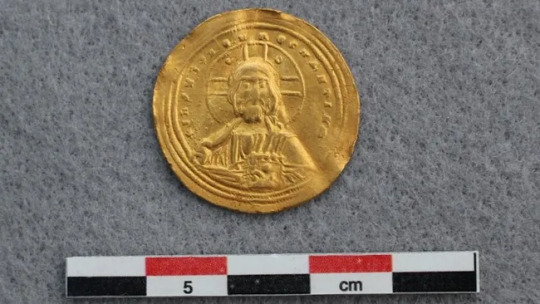
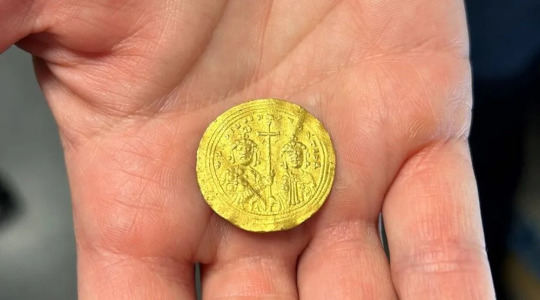
Known as a "histamenon nomisma," this type of small coin was first introduced around A.D. 960. It shows Jesus holding a Bible on one side and the images of Basil II and Constantine VII, two brothers who both ruled the Byzantine Empire, on the other.
It's possible that the coin was used as part of a dowry for Harald III to marry the daughter of Prince Yaroslav (also known as Yaroslav the Wise) of Kyiv, in what is now Ukraine. It also may have been used as a form of trade, according to the statement.
Archaeologists plan to return to the mountain site in 2024 to conduct further excavations.
Additional info by - Colin Walker
The great Viking leader Harold Hardrada, the guy whose failed invasion of england allowed william of normandy to face tired and weakened english army in 1066 had been the head of the varangian guard. The varangian gurd was the elite military unit if the Byzantine empire and was made up of proffessional warriors drawn from the north of europe.
As an Aside the Byzantine empire never lost a battle where the varangian gurd took the field.
The varangian guard gained great politicla as well as military strength. When the guard under hardrada wasn't paid they effectively mutineed and on there way out helped themselves to the byzantine treasury.
Huge amounts of byzantine gold ended up in northern europe, particularly scandinavia.
That means finding a byzantine gold coin there is just as likely as finding one in modern turkey.
2 notes
·
View notes
Text
Being obsessed with The Mandalorian, I'm thinking of a Viking-style Mandalorian. I want this so bad. Both are fierce warriors, some of the fiercest history has seen throughout all the eras. Both follow a religious creed. Helmets are important to both, although Mandalorians more than Vikings.
Conclusion: Mandalorians are sci-fi Vikings, sort of. I'd give their likeness more to crusaders to be honest, but with the prowess of Vikings. So essentially, the Varangian Guard of Mandalore, times a million.
14 notes
·
View notes
Text
People think about Roman Empire, I think about my old Polissian village which my family takes roots from, and that there is an ancient stone cross in the center of the graveyard, and under that cross lies a 2 meters tall warrior with a varangian/old baltic(?) sword and armors. Friends of my great grandma decided to dig it up secretly because it was considered a desecration, and that's how they found out. I want to explore it sooo bad but I can't thanks to russia.
#what if that sword was old curonian sword#what if that sword had some authographs? or even words#who was that man from#did he live in my village or was he buried like a foreigner without offspring#what did he die from or because of whom
6 notes
·
View notes
Text
oh boy, old johnny really is in it today in castle dracula
We don't see much historical context, but Jonathan does finally mention some of the gifts given to him by the coach passengers! "crucifix, garlic, wild rose, and mountain ash". The crucifix and garlic we of course understand (although it's more likely to be garlic blossoms, rather than the bulbs).
Wild rose I heard mentioned in a video essay on Dracula by Overly Sarcastic Productions. if their research is correct, it was believed that laying a wild rose on a vampire's coffin lid would prevent them from exiting the coffin come nightfall. Mountain ash, aka rowan, seems to have been associated with protection in general from a quick Google to check, especially from magic or enchantment.
Boyars have been mentioned before; the term is used a lot in Russia and Russia-adjacent countries in Eastern Europe. It seems to be about equivalent to a Duke/Duchess role, being second only to the ruling family.
Here, in the whirlpool of European races, the Ugric tribe bore down from Iceland the fighting spirit which Thor and Wodin gave them, which their Berserkers displayed to such fell intent on the seaboards of Europe, ay, and of Asia and Africa too, till the peoples thought that the were-wolves themselves had come.
The best guess I have at what the Count is referencing here is the general habit of Norse people, during the Viking age (~800s-1100s), of sailing down rivers to raid places. We know that by following the Volga down south Vikings reached the Black Sea, as far south as Constantinople (then capital of the Byzantine Empire), because we have records of Norse men serving as warriors in the Varangian guard. The Kievan Rus were also active in Eastern Europe around the same time, pretty much through the extent of the Viking age, although I believe it's still debated whether they count as 'Vikings'.
No idea why he specifies that they came from Iceland. While in the Icelandic sagas, heroes taking a break to go off east and do some raiding abroad is somewhat common, it's far more likely that anyone attacking Eastern Europe would be from Sweden, Norway, or Denmark (possibly also Finland, although with how borders were different back then and how Finns are referenced in Icelandic sagas, my main reference, I have no idea where the Finnish factor into things here).
EDIT: Wodin is of course Odin; the W- spelling (Wodin or Woden) is more commonly found in Old English sources.
...they found the Huns, whose warlike fury had swept the earth like a living flame, till the dying peoples held that in their veins ran the blood of those old witches, who, expelled from Scythia had mated with the devils in the desert.
This is a complicated sentence full of commas, as literature of this period will do. I think Drac is saying the people being conquered by the Huns thought the Huns were descended from witches and devils, which, sure, why not. We've already had plenty of weird otherizing descriptions of other ethnicities.
Attila the Hun ruled during the mid 400s, which means Drac is correct that the Huns were there long before the Vikings. No comments on the historical veracity of witches being expelled from Scythia.
Arpad is a historical person whose life seems to be hotly debated. Whatever the case, Dracula's assertion that he is Hungary's founder appears to agree with Hungarian sentiment (Hungarians, feel free to correct me if I'm wrong, I'm not really going farther than Wikipedia because I'm just having fun with this). "Honfoglalas" seems to be the Hungarian word for "the Hungarian conquest of the Carpathian basin", aka, the military action the Count is describing when he mentions Arpad.
and to us for centuries was trusted the guarding of the frontier of Turkey-land
I mentioned the Byzantine Empire earlier, and I'm going to take a stab that, since we're talking about medieval history still (9th century ish), Turkey-land is a reference to this Empire, since Constantinople, the imperial capital, was right at the gate between the Mediterranean and the Black Sea, and the Byzantines were largely occupying Greece and Turkey at this time.
This link (X) is the only reference I could find with a quick search as to "the shame of Cassova". It seems that Cassova is a misspelled 'Kosovo'. As for the rest of this:
When was redeemed that great shame of my nation, the shame of Cassova, when the flags of the Wallach and the Magyar went down beneath the Crescent? Who was it but one of my own race who as Voivode crossed the Danube and beat the Turk on his own ground? This was a Dracula indeed!
'Voivode' seems to be a military/nobility title akin to a general, or more like a medieval lord leading his feudal serfs to battle.
Drac's references to this noble Dracula who was betrayed by a brother seem to be references to the actual historical Vlad Dracul, aka the Impaler. I can't tell if it's just hard to do good research while eating breakfast and not giving it 100% of my attention, or if the problem is Stoker just saying whatever he wanted, but luckily I'm not the first person to write about the Dracula-irl Dracula links.
As a reminder, while I'm doing all this linking to Wikipedia and other non-academic sources, always fact check your research against other sources and make sure it's verifiable. Don't trust random people on the internet. If I were writing a thesis paper this would be completely unacceptable levels of research dedication. Luckily I am also a random person on the internet.
We leave off with Jonathan referencing Arabian Nights, a rather famous story. In it, a woman, Scheherezade, is married to a king who kills his brides every morning after the day he marries them, so she tells him stories that end on a huge cliffhanger each dawn and refuses to continue until the next night. That way, he's too invested to kill her that day, and she has at least 12 more hours of being alive (and to think up an ending, and a new story to cliffhanger).
36 notes
·
View notes
Photo



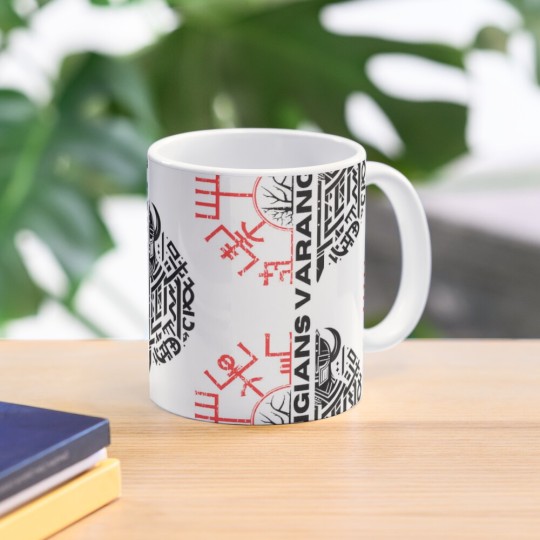

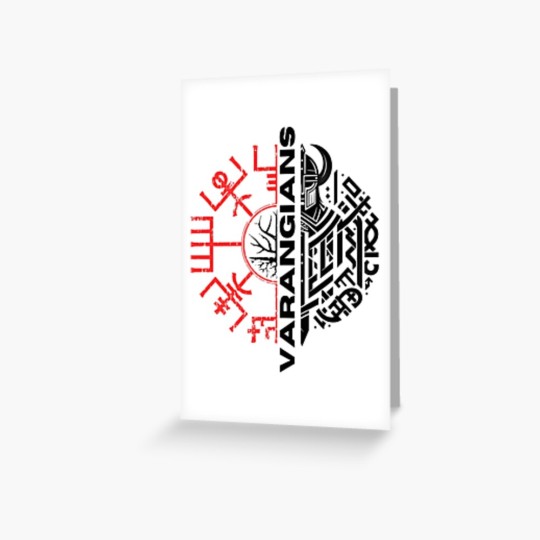




Embellish your space with the elite Varangian Guard design, a perfect blend of Norse valor and Byzantine artistry. (via "Varangian Elite Guard - Byzantine Warrior Art" Premium Scoop T-Shirt for Sale by ZbigArt)
#findyourthing#redbubble#Varangian guard#byzantine warrior#medieval history#elite guard#ancient warrior#military history#guard artwork#byzantine#byzantine empire#norse warriors#zbigart
0 notes
Note
FFF!!!
You're getting Viking graffiti, hope you don't mind.
Alright so the Hagia Sophia, that massive mosque in Istanbul?
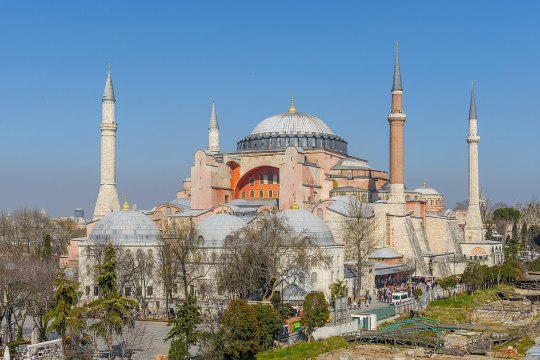
You probably know that before the Ottoman Turks conquered the city, back when it was Constantinople, this was a church. Well something some people don't know is that in the days of the Byzantine Empire, someone put graffiti on one of the walls on the top floor. A lot of it doesn't survive, but--
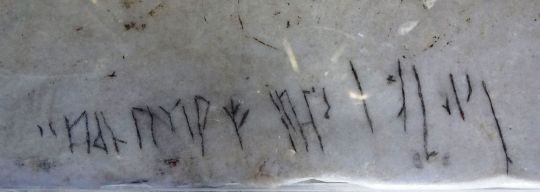
"Halfdan carved these runes." There's another that said much the same thing but with the name 'Ari.'
There's also a shoutout to this in Assassin's Creed: Valhalla in the modern day segment, in which you can see the carving on a rock, which fans are speculating what it means.
Also! There was a lion statue in Piraeus graffiti'd with runes:
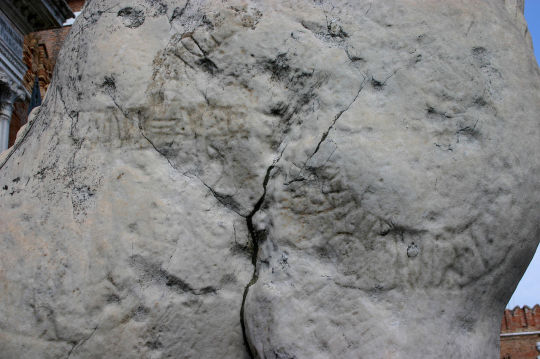
So what's the story here?
Okay, so the Byzantine Empire had something called the Varangian Guard, a group of Nordic warriors who were hired as elite guards. 'Cause, you know, those guys could fight. It's likely they, in their time off, decided to go around and carve their names in stuff.
As one does.
15 notes
·
View notes
Note
Will you tell me about your hellsing OC?
Before I begin: (I'll give a basic but vague rundown of my oc in the form of a letter sent from him to one of his Welsh cousins. The reason why I'm doing this is because the story is complicated and I'd rather give a vague look into the world of my fic and oc to make the reader question what the world is about but still tell a story. Also my commissioned art for my oc is not yet complete.)
___________________________________________
(This letter was approved by censors and sent through secure communication line 1-3 via telegraph)
Reason: Informal Communique between commanders of Varangian Guard.
Sender: Sigurðr Magnusson, leader of the Varangian Guard's 1st Expeditionary Force.
Letter Date: January 7th, 1996
Dear Anaraut,
It's your cousin, Sigurd. I've written to you to tell you that I'm in the town of Iaşi and wanted inform you that I'm in dire straights because I heard that you, your brother, and other cousins are going back to Wales and England to secure some areas seeing vampire attacks. I, unfortunately will not be able to go with you because I'm going to lead an offensive into Moldavia and South Western Ukraine with 39,000 soldiers and several armored battalions along with a few divisions acting as reserves to our advance for support into the Moldavian capital of Chișinău and from their we'll consolidate other forces and local armies to turn the tide further in our favor.
There's not much resistance to be expected from what my scouts have told me about the general area, and my lesser officers have reported a few clusters of medium sized skirmishes in the north east and directly east. I don't know why they're leaving the rivers open to Harald Hardrada's fleet to just raid into Russia but it may be a trap for all we know.
I've heard rumors though. Rumors that the hordes of lab created vampires, among with other monsters, are heading towards Kyiv, pushing past several divisions and nearly facing the widest point of the southern Dnieper river. If they push past Kyiv and head towards Chernobyl it will lead to dire consequences for the whole world.
We cannot let this happen. The army that I lead knows this as well and are more than prepared to blitz into Ukraine's border and rocket towards Kyiv without a single hesitation and leave the cleanup to the local forces and reserves.
To be honest with you, I'm scared, angry, and willing to die to stop this from happening. In the name of Thor I will protect humanity and stop this tragedy from unfolding with my dying breath if I must. My soldiers are also willing to throw their lives away to protect humanity with the same enraged and desperate fervor as well. We won't let these bastards cause more mothers to weep for lost children, we won't let them take our brothers away, we won't let them take children's parents, we won't let these monsters reek such destruction onto this planet anymore. Wish me luck, and if it is ever to be that I die, then I hope to see you in Valhöll. If you are ever carried to the hall of Oðinn's chosen warriors by the Valkeries, you may find me there.
Wish me luck, Anaraut.
Your cousin,
Sigurðr
I hope this somewhat works @rotten-hearts-sharp-teeth
#I hope this works to give some insight into the character before I release a post telling all about Sigurd#answer#hellsing#hellsing oc
6 notes
·
View notes
Text
I’m really really really into dark souls right now.
I beat DSR using the black knight halberd from the start, which was super fun.
I’m nearing the end of DS2 using hex which is a lot of OP fun, continuing the trend.
I’m not sure on DS3 whether to try and kill the dancer early to get OP, or whether to just try and beat the game using the vordt hammer. I’ve only beaten DS3 twice before and both have been relatively straightforward sword and board play throughs. It would fit my recent DS2 play through to do magic, or my recent DS1 playthrough to get an OP weapon early and do the bosses in the wrong order.
But also I’ve been planning out cosplay/themed/roleplay runs for DS1-3 and ER of whole armor sets you can get early, and then the idea of only using weapons that the wearer of that armor set use, whether it’s a named NPC or a common enemy.
For DS2, I really wanna do the most basic Hollow Soldier infantry from the first level , just use their basic sword, axe, dagger, bow, shield. It would be pretty simple to upgrade all those items all the way before too long. And I’d probably use the non-hollow version of their armor from Maughlin. And I’d still probably do the dragon rider walkoff + ascetic combo to have stupid high stats for the early game.
Hollow Soldier would be another contender for a run, the more heavily armored basic guys. But the idea of beating the game as a “goomba” cracks me up. Also I’d have to plan what starting class has stats to best take advantage of their gear.
Other DS2 contenders include the Old Knights in Heide’s tower of flame, heide knights maybe, the drangleic set, the Varangian Viking dudes, or even murdering old sentinel targaryn
DS1 has some great early options too like Solaire, Oscar, crestfallen warrior, or any of the early enemies.
DS3 also has a couple nice options. I think the lothric knight might be the strongest, their armor and sword are both cool but I’d have to level my armor wearing Stat a bunch.
DS3 it would also be fun to play as “the master”, the half naked katana NPC at the start of the game. You get his sword and clothes just by killing him but that armor seems not great, so maybe once I’m better at the game.
The other main DS3 run that would be fun for me would be the evangelist, with their big fluffy clothes and spike mace
I just like the idea of these early game sets being almost like alternative starting classes. I do also like the idea of a run using only the starting gear, which seems way harder in DS2.
Oh, and then Elden ring the only real ideas I had were godrick soldier or vulgar militia
But I might have to wait on playing DS2 more because I’ve gotten sucked back into VLR but no spoilers please
2 notes
·
View notes
Text
Hehehheheh, thought the other post was the only stuff I had? WRONG, I HAVE NO LIFE HAHAHHAHAHA
Mordred took another swig from his cup, the fiery Kievan spirit slowly sliding down his throat. Gasping, he smacked it down again, silently wondering when the drink would end. Looking up, he noticed Kairi tapping away at the surface of the wooden table, still watching the door. "When are these people here, anyway? It's felt like hours now."
"They’ll be here, don't worry. You just need to be patient." Kairi said simply, continuing to stare at the door. Mordred groaned at the response and slumped onto the table. "I bet they're late." He mumbled into his arm. Kairi snorted lightly at the young warrior's response, before noticing something at the door.
"I wouldn't take that bet if I were you."
"Huh?" Mordred spun round to see where Kairi was looking, and now saw three people had entered the tavern. The first was a short man in rather extravagant clothing for the location, with short, well-kept hair and a styled goatee. Behind him came a purple haired woman who eyed the tavern suspiciously, dressed in white and blue, and holding a polearm with a cross-like point. The most interesting, however, was the person taking up the rear.
He was tall, around 6 feet, dressed in a white tunic with black breeches, and a pair of thick, leather boots. His hair, a light silver, was held in a pony tail that fell down his back, its colour contrasting against his blue eyes and darker skin. Oddest of all, on the top of his head were a pair of horse ears, the same colour as his hair.
Must be storm touched, Mordred mused to himself.
The man in front quickly spotted the pair and waved, rushing over with his companions in tow. "Ah, Kairi! It's so good to see you, my friend!"
"You too, Shakes," Kairi responded warmly as he stood, wrapping the man in a large hug. "It's been too long."
"Yes, it has. Have to say, I was truly surprised to get your letter," he turned now to Mordred, looking him up and down. "I assume this is the Mordred you spoke of?"
"Yeah, it is," Kairi nodded to the man, then turned back to Mordred. "This is Shakespeare, an old colleague."
"Pleased to make your acquaintance, young man," Shakespeare bowed extravagantly, holding out a hand to Mordred as he did so, which he eyed in confusion. After a few seconds, he took it and shook, which seemed to please Shakespeare, who left his bow.
"Now then," Kairi interrupted, drawing Shakespeare's attention back to him. "About why we're meeting."
"Ah yes, of course. I'm afraid I can't get you to Nova Roma."
"What?"
"Yes, sadly, the romans weren't willing to go to war with the Franks and their Holy Empire
over my 'dark, heretical magic', so I got banished. However! I believe my two friends here may be of assistance to you."
Kairi nodded. "Right. I was wondering when you'd introduce your… colleagues."
"Yes, yes, of course!" Shakespeare quickly strode around the purple haired woman, placing a hand on her shoulder. "This is Martha, dragon of the Romans, and a big wig in empire's politics."
"Pleased to meet you," Kairi said warmly, which Martha smiled and nodded to. "And you."
"And this," Shakespeare planted his other hand on the silver haired man's shoulder, "is Caeneus, one of the spears of the Varangian Guard." Caeneus nodded at his introduction.
"It's good to meet you too, Caeneus." Kairi spoke, then turned back to Shakespeare. The two quickly found themselves in conversation and, now let go of, Martha quickly found her way to the bar. Caeneus instead chose to sit down opposite Mordred, eyeing him curiously as he drank, which Mordred raised an eyebrow to. A few seconds of silence passed.
…
"Aren't you a bit short to be a merc?"
"You what!?" Mordred spat back angrily, smacking his hands on the table.
"I'm just saying, it's a hard, physical job. Most people are, ya know, tall, muscular, all that. You're… not that."
"I-"
"Are you even 5 feet tall?"
…
A blush broke Mordred's face as he slumped back down. "... I'm 5' 1." Caeneus snickered at his bashful response. "Wow, you really are tiny."
Mordred was soon saved from further embarrassment by one of the staff, who came over to serve Caeneus. As he decided on his meal, Mordred silently seethed.
He was not going to let this stuck-up roman win that easily.
3 notes
·
View notes
Text
Varangian Guard (Greek/Scandinavian, Eastern Roman)
Immortal Infantry (Persian, Achaemenid Empire)
Janissary Infantry (Turkish, Ottoman Empire)
Deli Calvary (Turkish, Ottoman Empire)
Eagle Warrior (Mexica, Aztec Empire)
Jaguar Warrior (Mexica, Aztec Empire)
Berserker (Nordic)
Companion Calvary (Greek, Hellenistic Empire)
Winged Hussars (Polish, Polish–Lithuanian Commonwealth)
Scarae / Caballarii (Frankish, Carolingian Empire)
Hearthweru (Anglo-Saxon)
Wei Wuzu (Chinese
Jin Beifu Army (Chinese
Xuanjia Army / Xuanjiajun (Chinese
Beiwei Army (Chinese)
Gendarme Army (French)
Tercio Army (Spanish, Hapsburg Spanish Monarchy)
Cavalieri Addobbati (Italian)
Mubarizun (Arabic, Rashidun Caliphate)
Grivpanvar (Persian, Parthian / Sassanian Empire)
Timarli Sipahi, Silahtars (Turkish, Ottoman Empire) Kapikulu Sipahis
Mamluks (Various, typically Europeans, Abbasid Caliphate)
Argyraspides (Greek, Hellenistic Empire)
Sacred Band of Carthage (Phoenician, Carthaginian Empire)
Mobile Guard (Arab, Rashidun Caliphate)
Jazāyerchi (Persian, Afsharid Dynasty)
Triarii (Latin, Roman Republic / Empire)
Housecarls (Scandanavian)
Red Devil Brigade led by li Naomasa ( Japanese)
Takeda Red Calvary Core (Japanese)
Qingzhou Corps (Chinese)
Medjay (Nubian, Egyptian)
Legio X Equestris
Qizilbash
0 notes